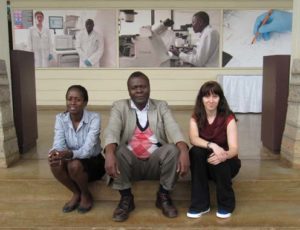As the FoodAfrica Programme aims for capacity building in the Programme countries, altogether eleven PhD students have been recruited from different academic institutions to work on their theses as part of the Programme. FoodAfrica will strengthen the cooperation between researchers and training and research institutions in the region and enhance efficient knowledge dissemination between African, Finnish and CGIAR experts.
Combining applied research with development cooperation including extensive involvement of different research centers and academic institutions is a new model for cooperation that is now piloted within the FoodAfrica Programme.
At ILRI three PhD students, Anima Sirma, Sara Ahlberg and Daniel Mugangai, concentrate on the research activities of FoodAfrica work package 5 aiming to reduce the risk of mycotoxins in Kenya.

Anima Sirma, 28, from Kenya is a PhD student at ILRI. Her research is on risk assessment of aflatoxins in the Kenyan dairy value chain. The research is contributing to fulfillment of objectives for FoodAfrica work package 5. She has been mentored into research by her university professors and currently she is doing her PhD in order to enhance her research skills and to develop research methodologies.
Anima is passionate about conducting research that will help solve food insecurity in her country and East Africa as a whole. In regard to her research on aflatoxins, she hopes to identify the best options for its control. This will reduce crop losses caused by aflatoxins and thus improve food security and quality.
Sara Ahlberg, 29, is a dairy technologist (MSc) from the University of Helsinki, Finland. At ILRI she is working as an Associate Junior Professional Officer (JPO). Her research area is in aflatoxins, lactic acid bacteria and dairy proteins. She is creating a novel biotechnical approach to reduce the aflatoxin induced risks in food and feed, which is also her PhD topic. She has been working at ILRI since June 2013 and her work is thus still in the very beginning.
Sara’s work is to increase food safety mitigating the aflatoxin risks in a wider food security perspective. She finds the current and emerging research potentials in ILRI most relevant to her interest areas at the moment. She wants to work with milk products and do research with practical impact on the food safety in areas where the consumer choices are still limited.
Sara is expecting to end up with a solution which is transferable to practice in the future. Furthermore, she wants to find solutions which are able to increase the food safety also in other areas and maybe in other contexts.
Daniel Mugangai, 54, from Kenya is a Lecturer in Food safety and Zoonosis at the Department of Public Health Pharmacology and Toxicology, Faculty of Veterinary Medicine at the University of Nairobi in Kenya. At ILRI he is a PhD student on the My Dairy project, which is part of the FoodAfrica Programme. His doctoral thesis will determine the prevalence and levels of aflatoxins in the Kenyan dairy value chain and identify the critical control points that maybe used in the control of aflatoxin contamination. The cost effectiveness of the available mitigation strategies will be assessed.
The research will contribute to knowledge used in increasing dairy productivity and reduction in disease burden due to aflatoxins in man and dairy cattle. The knowledge from Daniel’s research will be passed on to students at his faculty, who will be involved in developing food security upon graduation. Dissemination of the knowledge to local farmers will be done through agricultural, veterinary and public health authorities.
